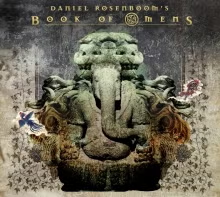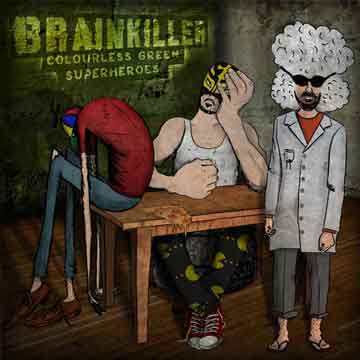CD Review: "Book of Omens" and "Colourless Green Superheroes"

Book of Omens. By Daniel Rosenboom. Los Angeles: Daniel Rosenboom Music, 2013. More information: http://danielrosenboom.com/book-of-omens
Colourless Green Superheroes. By Brainkiller (Brian Allen, Hernan Hecht, Jacob Koller). London: RareNoiseRecords, 2013. More information: http://www.rarenoiserecords.com/
---
"Everything you read about jazz is: 'Is it new? Is it innovative?' I mean, man, there's 12 fucking notes. What's going to be new? You honestly think you're going to play something that hasn't been played already?"
--Jazz saxophonist Branford Marsalis in a 2011 interview
Now that we're over a century into this grand sonic experiment known as jazz, it keeps getting harder and harder to play something new. In this sense, Marsalis's exasperation certainly rings true (if also a bit ethnocentric, given the myriad of tuning systems that extend far beyond the 12 notes with which he is familiar.) Indeed, the tonal limitations perceived by Marsalis and his contemporaries, starting in the mid-1980s, have been a pillar of jazz practice since then: many jazz musicians of his generation have focused on recapturing the tried and true sounds of past jazz masters.
Yet despite these challenges, other creative musical improvisers forge ahead. And contrary to Marsalis's bleak indictment of jazz today, many of them are managing to make music that sounds new and innovative (and pretty great, to boot). And although they are still mostly hewed in by those same 12 notes, these musicians are finding new sonic frontiers for experimentation---mostly in the realm of timbre, that tough-to-pin-down dimension of sound that gives every musical utterance its distinctive quality. Jazz musicians have a long history of experimenting with timbre: Duke Ellington's "Jungle Sound," Albert Ayler's explosive extended techniques, Sonny Sharrock's distorted proto-punk, and Herbie Hancock's avant-funk project Mwandishi are just a handful of examples. And to my ears at least, the last few years have brought an acceleration of this trend. Two new albums released this month, Book of Omens by the Los Angeles-based trumpeter Daniel Rosenboom and Colourless Green Superheroes by the eclectic trio Brainkiller, show where some of these timbral explorations seem to be headed.
Before I discuss what each album has to offer individually, it bears mentioning that these two records have a lot in common, as is evidenced by the beginning of the first track of both records. Here's the opening track "Prologue: The 12 Signs" from Book of Omens:
And "The Vindicator Returns," from Colourless Green Superheroes:
Although the harmonic language of each track is distinct, the timbral similarities are striking. Both feature blasting, distorted dissonances and powerful extended drum fills that accentuate the thumping bass drum, sounds most commonly associated with heavy metal. But this isn't "fusion" either---both albums hold together as the sophisticated compositional statements that one would expect from a musician trained in the rigors of jazz performance, evoking sounds of metal as well as funk, prog rock, free jazz, and electronica. Rather than an awkward step into unfamiliar musical territory, these artists engage this wide timbral landcape with the same cleverness and creativity that their forebearers such as Wayne Shorter and Miles Davis did with harmony in the 1960s.
Rosenboom's Book of Omens, which will be performed live tonight in Los Angeles, does this with a five-piece ensemble composed of drummer Matt Mayhall, woodwind multi-instrumentalist Vinny Golia, electric guitarrist Jake Vossler, electric bassist Tim Lefebvre, and Rosenboom on trumpet and flugelhorn. Vossler's guitar work is key to the overall sound: the combination of rapid-fire virtuosity (evident especially on track 2, "Playing With Fire,") and expert manipulation of distortion opens the space for the more "jazz-sounding" horns to bring their sound into the mix. Mayhall's versatility, from no-holds-barred drumset pounding to attentive and precise auxiliary percussion effects, along with Lefebvre's gigantic sound and mastery of electronic effects, round out a perfect "rhythm section" for this project. I put the term in quotes, because throughout most of the free-flowing compositions, rhythm takes a backseat to timbre; however, these musicians provide a timbral foundation in a similar way that a traditional rhythm section would lay down the groove.
Golia and Rosenboom float masterfully over the top of these shifting timbres. Golia, Rosenboom's former professor at CalArts and mentor to many young LA improvisers, alternates between a variety of woodwind instruments on each track, matching each with the demands of each track---rumbling etherially on bass clarinet, belting saxophone skronk, and a variety of shades in between. Rosenboom, operating perhaps the most timbrally limited instrument, nonetheless has created a cycle of compositions that allow for his trumpet to fit on the top of all these different sounds. His tone is piercing and unwavering, full of confidence that soars over the band with the same grace and power of a big band's lead trumpet. Supported as it is by such a rich foundation, he projects himself effortlessly, providing the keystone for the robust sonic structures the band builds here.
Video trailer for Book of Omens
 Although Colourless Green Superheroes opens with similar material to Rosenboom's epic suite, the more stripped-down trio of trombone, keyboards, and drums takes their timbral adventure in a number of different directions. Keyboardist Jacob Koller takes more of the timbral responsibilities, although trombonist Brian Allen and drummer Hernan Hecht mix themselves into the blend as well. As a fellow trombonist, I'm particularly impressed by Allen's use of the full range of the instrument, taking advantage of the different timbres that different registers have to offer. The three also jump back and forth across distinct musical layers, mixing them together in suprising ways. This excerpt from the second track, "Scribble," demonstrates this nicely:
Although Colourless Green Superheroes opens with similar material to Rosenboom's epic suite, the more stripped-down trio of trombone, keyboards, and drums takes their timbral adventure in a number of different directions. Keyboardist Jacob Koller takes more of the timbral responsibilities, although trombonist Brian Allen and drummer Hernan Hecht mix themselves into the blend as well. As a fellow trombonist, I'm particularly impressed by Allen's use of the full range of the instrument, taking advantage of the different timbres that different registers have to offer. The three also jump back and forth across distinct musical layers, mixing them together in suprising ways. This excerpt from the second track, "Scribble," demonstrates this nicely:
Brainkiller also create some fascinating rhythms within this timbral variety---both contrasting passages in the excerpt above could be the basis for a funky groove in its own right. The group posits this penchant for funk one one pole, and include spaced-out, etherial sounds on the other. In this latter effort, they are aided tremendously by the vocalist Coppe', whose airy voice adds another timbral layer to the group's palette. When Coppe' sings, things really stretch out---and to great effect. The band also isn't afraid to evoke some old-school swing on the album, as when Koller struts his stride chops and Allen whips out a plunger mute on "Noodlin'," which then unexpectedly turns into an uptempo rock jam.
By the group's own admission, this album feels much less improvised than most jazz records---as Allen put it, "I would say that this album is pretty composed. These songs are not really for open improvisation or that kind of thing. You might hear a trombone solo or a keyboard solo, but even then weʼre thinking, ʻHowʼs it going to function compositionally and how can it take us somewhere or whatʼs it going to add as opposed to having something to fill up the time or the space?ʼ" This compositional approach works very well in this context, giving each musician just enough space to stretch out and do his thing, but also pushing the sound into a number of places that it might not otherwise go. The result is delightfully weird: at times laid-back funk, or pedal-to-the-metal rock, or even bizarre sampling and absurdist humor.
Video Trailer for Colourless Green Superheroes
--
Alex W. Rodriguez is the Managing Editor for the Ethnomusicology Review Sounding Board. He is also a writer, trombonist, and PhD student in ethnomusicology at UCLA.





